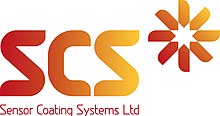Sensor Coating Systems
A major contributor to this article appears to have a close connection with its subject. (October 2018) |
This article contains content that is written like an advertisement. (October 2018) |
 | |
| Industry | Instrumentation |
|---|---|
| Founded | 2012 |
| Headquarters | London, England , United Kingdom |
Area served | Automotive, Power Generation, Aerospace, Oil & Gas, Industrial Processes |
Key people | Will Iselin (Chairman) Dr Jörg P. Feist (Managing Director) Dr Silvia Araguás Rodríguez (Technical Director) Dr Maurice Dixson (Non-Executive Director) Barry Shaw (Non-Executive Director) Professor Andy Heyes (Non-Executive Director) Professor John R Nicholls (Non-Executive Director) |
| Products | / Thermal History Paint / Erosion Mapping |
| Services | High Definition Thermal Mapping |
Number of employees | 20 |
| Website | www.sensorcoatings.com |
Sensor Coating Systems is an instrumentation company that develops temperature-sensing technologies.[1] It was formerly part of Southside Thermal Sciences.
At the beginning of 2018, Sensor Coating Systems started a project with NASA and other companies working in the aerospatial industry. This project called CAUTION has the aim to increase the temperature range of the Thermal History Coating. Such improvements can help end-users to develop new jet engines with higher efficiency which are safer than previous iterations.[2]
History[]
Sensor Coating Systems is located in London. It was spun out of Southside Thermal Sciences in 2012, as it became apparent that Southside Thermal Sciences' future product development focus should be on a smart offline temperature-sensing technology. Sensor Coating Systems' technology has received several awards[3][4][5][6] as well as grants from governmental entities such as Innovate UK and the National Aerospace Technology Exploitation Programme.
Technologies[]
Sensor Coating Systems has developed two offline temperature measurements: thermal history coatings and thermal history paint. These technologies utilise the luminescent properties of materials to provide information on past temperatures that they experienced.[7] This patented technologies allow for the readout of past temperatures from a continuous surface, enabling the thermal analysis of components, which have been operated in extreme conditions, such as jet engines and industrial gas turbines. The table below shows the differences between the Thermal History Coating and the Thermal History Paint:
| Characteristics | Thermal History Paint | Thermal History Coating |
|---|---|---|
| Temperature range | 150 to 1,000°C | 500 to 1,600°C+ |
| Application | Air spray | APS (Atmospheric Plasma Spray) |
| Durability | Medium | High |
| Thickness | 0.03 mm | 0.03 mm |
| Hazardous Materials | None | None |
| Measurement's accuracy | between ±5-10°C | between ±5-10°C |
A thermal history coating is a robust coating containing various non-toxic chemical compounds whose crystal structures irreversibly change at high temperatures. This allows for temperature measurements and thermal analysis to be performed on intricate and inaccessible components, which operate in harsh environments. Thermal history coating provides protection from intense heat to the surfaces on which they are applied. The thermal history paint is less durable than the thermal history coating. The thermal history paint can be applied with an air spray gun.
User club[]
In February 2013 Sensor Coating Systems announced the formation of an industrial “User Club” to promote the development of its patented temperature-sensing technology, the Thermal History Coating. The User Club was initially launched with four members in addition to Sensor Coating Systems.[8] The aim of the User Club is to catalyse the development of Thermal History Coatings, so that they can be applied in engine development programs to lower costs and accelerate the introduction of low-emission engines.
Awards[]
- Barking & Dagenham Chamber of Commerce - Business of the Year (2017)[6]
- Royal Society of Chemistry Award (2016)[9]
- British Engineering Excellence Award - Materials Application of the Year (2013)[5]
- Runners-up, European Academic spin-out award 2013, Brussels[4]
- ASME, 2012 John P Davies Award[3]
References[]
- ^ Mapping, Sensor Coating Systems Ltd - High Definition Thermal. "Thermal History Technology - Sensor Coating Systems Ltd - High Definition Thermal Mapping".
- ^ http://www.sensorcoatings.com/sensor-coating-systems-launches-new-national-aerospace-project-together-natep-leading-international-players/
- ^ a b "ASME Community". community.asme.org.
- ^ a b "Brochure" (PDF). secure.cfauk.org.
- ^ a b "Archived copy" (PDF). Archived from the original (PDF) on 2013-11-12. Retrieved 2013-11-12.
{{cite web}}: CS1 maint: archived copy as title (link) - ^ a b "Sensor Coating Systems wins Business of the Year 2017 from Barking & Dagenham Chamber of Commerce - Sensor Coating Systems Ltd - High Definition Thermal Mapping". www.sensorcoatings.com.
- ^ J. P. Feist, J. R. Nicholls, M. J. Fraser, A. L. Heyes (2006) "Luminescent material compositions and structures incorporating the same" Patent PCT/GB2006/003177
- ^ "Archived copy". Archived from the original on 2014-05-19. Retrieved 2014-05-19.
{{cite web}}: CS1 maint: archived copy as title (link) - ^ "Sensor Coating Systems wins prestigious Royal Society of Chemistry Prize - Sensor Coating Systems Ltd - High Definition Thermal Mapping". www.sensorcoatings.com.
- British companies established in 2012
- Companies based in the London Borough of Barking and Dagenham
- Luminescence